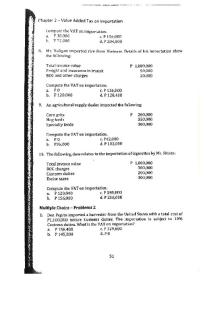Assignment 3 - Lecture notes 3 PDF

| Title | Assignment 3 - Lecture notes 3 |
|---|---|
| Author | Ritchelle Joy Tacandong |
| Course | Law |
| Institution | Manchester Metropolitan University |
| Pages | 3 |
| File Size | 71.4 KB |
| File Type | |
| Total Downloads | 360 |
| Total Views | 926 |
Summary
Define or give the meaning of the following: a. Generic or indeterminate thing It is a thing that a debtor is responsible to give to the creditor; it cannot be substituted with a thing that is as same kind or quantity of it. It refers to a class wherein it cannot be specified from other things of th...
Description
1.
Define or give the meaning of the following:
a.
Generic or indeterminate thing It is a thing that a debtor is responsible to give to the creditor; it cannot be substituted with a thing that is as same kind or quantity of it. It refers to a class wherein it cannot be specified from other things of the same class.
b.
Personal right It is our right or our power to voice out things that we know that our rights. For example, a child is abused by his parents. It’s his right to demand or he has the right to demand for what is right.
c.
Legal delay or default It means failure to accomplish or do/ perform his obligation on time which results to violating or breaking the law or the agreed legal contract.
d.
Fortuitous event It is an inevitable event, meaning it is impossible to avoid. It is an occurrence of something unexpected and cannot be foreseen, and even foreseen is unable to avoid since it is inevitable.
e.
Diligence of a good father of the family. In obligation, it means that the obligor is required or has the duty to put care or take every of
his actions or anything that he has to give with care, like in materials, it looks like that he should handles it like he owns it.
2.
What rights are given by law to the creditor in case the debtor fails to comply with the obligation to
deliver a specific thing? The creditor may take or bring actions to the court, since he has the right. Also, taking actions to the court or any legal ways of handling the situation can prevent the debtor to run away from his obligation.
3.
What are included to be delivered in an obligation to give a definite thing? Explain.
According to the Article 1166, the obligation to give a determinate thing includes the delivery of all accessions and accessories even though they may not have been mentioned. For instance, a person is obliged to replace a remote control toy car because he broke it after borrowing it. Since he is liable for it, he must give it or replace it, both the toy car with its remote control because the toy car (accession) cannot be used or played without the controller (accessories).
4.
Give the rules as to the liability of a person for loss or damage resulting from a fortuitous event. A person is not liable or responsible to a loss or damage resulting from a fortuitous event.
The obligation is extinguished, yet there are exemptions: when expressly specified by law, firstly, the debtor is guilty of fraud, negligence, and delay or contravention of the tenor of the obligation. Next, the debtor has promised to deliver the same thing to two persons who do not have the same interest to the thing, it would be impossible for the debtor to do his obligation to those creditors even without fortuitous events. Next the debt of a thing certain and determinate proceeds from a criminal offense, unless the thing having been offered by the debtor to the person who should receive it, the latter refused without justification to accept it. (Art. 1268.) and the thing to be delivered is generic (Art. 1263.) for the debtor can still comply with his obligation by delivering another thing of the same kind in accordance with the principle that “genus never perishes” (genus nunquam perit); and when declared by stipulation, this exemption rests upon the freedom of contract. The stipulation intends to better protect the interest of the creditor and make the debtor to fulfill his obligation. And if a fortuitous event occurred, the intention to make the debtor liable should be expressed clearly.
5.
Suppose the obligation of the debtor is to do something and he fails to do it or performs it in
contravention of the agreement, what are the remedies available to the creditor? The remedies available to the creditor if the debtor fails to do or perform his obligation in contravention of their agreement is to demand specific performance or fulfillment (if still possible) of the obligation with a right to indemnity for damages or demand rescission or cancellation (in certain cases) of the obligation also with a right to recover damages (Art. 1170) or to demand the payment of damages only where it is the only feasible remedy. 6.
Can a debtor be put on delay and consequently, incur liability even without demand from creditor?
Explain. No. If the creditor does not demand the debtor, it supposed that he is giving an extension of time for the debtor to do his obligation, and if it’s the case, the debtor will not incur liability. 7.
May an action arising from fraud be waived? Explain. Yes. If the debtor really commits a fraud, the creditor can waive an action or decides to
waive his right to indemnity and it will be considered as an act of forgiveness to the debtor. Waiver is void only when it is a waiver of an action for future fraud. 8.
May an action arising from negligence be waived? Explain. Yes. An action for future negligence, not fraud, may be waived except where the nature of
the obligation requires the exercise of extraordinary diligence as in the case of common carriers, but when the negligence shows bad faith, it is considered as equal as fraud. Any waiver of an action for future negligence of this kind is, therefore, void.
9.
Mr. Seller sold to Mr. Buyer on September 5, 2020, a horse named Gold to be delivered on
September 20, 2020. However, on September 15, 2020, Mr. Seller sold again and delivered the same horse to Mr. Third Person. Who has a better right to Gold? Explain. Mr. Buyer has a better right to Gold, since he was the one who bought it first. He was the first one who has the agreement with Mr. Seller and agreed to deliver Gold on a certain date. However, Mr. Seller still sold it to Mr. Third Person because Mr. Third Person bought it earlier than the date of delivery for Mr. Buyer.
10. Mr. S sold to Mr. B a specific refrigerator which Mr. S agreed to deliver not later than September 30, 2020; Mr. S did not deliver the refrigerator on said date. Is Mr. S guilty of legal delay? Explain. No, Mr. S is not guilty of legal delay but instead of ordinary delay. Since the problem didn’t tell why Mr. S made the delivery late, I can’t assume that it his intention to deliver it late or there’s a fortuitous event happened. I can say that he is guilty of ordinary delay since he failed to perform his obligation on time and it is not stated that they have made a legal contract so there’s no breach of the obligation. 11. D (debtor) borrowed P10, 000 from C (creditor) payable after one (1) year. Is D liable to pay interest? Explain. Yes, D is liable to pay interest if the both parties or both of them agreed with a certain interest to be paid after a year. It is D’s liability as he is the one who borrowed money.
12. Mr. Lessor issued a receipt that Mr. Lessee has paid the rent for the month of March 2020. Can Mr. Lessor still collect from Mr. Lessee the rents for January and February 2020 which are still unpaid? Yes. Mr. Lessor can still collect unpaid rent payments from Mr. Lessee from the previous months, since it is Mr. Lessee’s obligation to pay his rents as he is the one who is using or benefiting from the Mr. Lessor’s property.
Reference: OBLIGATIONS (Arts. 1156-1304.) HECTOR S. DE LEON & HECTOR M. DE LEON, JR. (June 2010)...
Similar Free PDFs

Assignment 3 - Lecture notes 3
- 3 Pages

Assignment 1 - Lecture notes 3
- 5 Pages

Assignment 6 - Lecture notes 3
- 3 Pages

3 - Lecture notes 3
- 7 Pages

Notes#3 - Lecture 3 notes
- 49 Pages

Lecture notes, lecture 3
- 8 Pages

Lecture notes, lecture 3
- 5 Pages

Lecture notes, lecture 3
- 59 Pages

Chapter 3 - Lecture notes 3
- 1 Pages

Chapter 3 - Lecture notes 3
- 30 Pages

Chap 3 - Lecture notes 3
- 4 Pages

CIV1000 - 3 - Lecture notes 3
- 4 Pages

Chapter 3 - Lecture notes 3
- 6 Pages

Chapter 3 - Lecture notes 3
- 6 Pages

Tema 3 - Lecture notes 3
- 2 Pages

Tema 3 - Lecture notes 3
- 4 Pages
Popular Institutions
- Tinajero National High School - Annex
- Politeknik Caltex Riau
- Yokohama City University
- SGT University
- University of Al-Qadisiyah
- Divine Word College of Vigan
- Techniek College Rotterdam
- Universidade de Santiago
- Universiti Teknologi MARA Cawangan Johor Kampus Pasir Gudang
- Poltekkes Kemenkes Yogyakarta
- Baguio City National High School
- Colegio san marcos
- preparatoria uno
- Centro de Bachillerato Tecnológico Industrial y de Servicios No. 107
- Dalian Maritime University
- Quang Trung Secondary School
- Colegio Tecnológico en Informática
- Corporación Regional de Educación Superior
- Grupo CEDVA
- Dar Al Uloom University
- Centro de Estudios Preuniversitarios de la Universidad Nacional de Ingeniería
- 上智大学
- Aakash International School, Nuna Majara
- San Felipe Neri Catholic School
- Kang Chiao International School - New Taipei City
- Misamis Occidental National High School
- Institución Educativa Escuela Normal Juan Ladrilleros
- Kolehiyo ng Pantukan
- Batanes State College
- Instituto Continental
- Sekolah Menengah Kejuruan Kesehatan Kaltara (Tarakan)
- Colegio de La Inmaculada Concepcion - Cebu